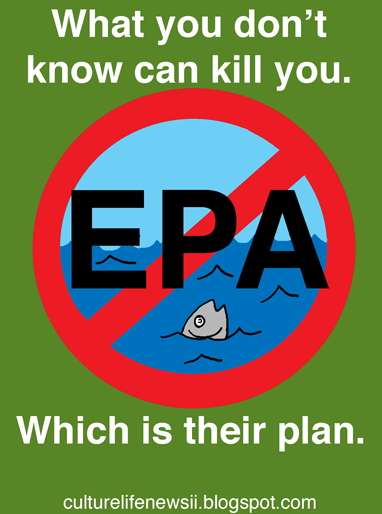Ever wonder what the value of human life is? The EPA value of a generic human life is showing signs of deflation, e.g., like housing and stocks, not like oil and food. Angry Bear’s Spencer England, reporting on the our generic value at the Angry Bear website:
Value of a Human Life
Courtesy of Angry Bear.
Here at Angry Bear we regularly report on the poor economic performance of the economy under the Bush administration.
But it now looks like we have a first.
The Environmental Protection Agency has lowered its estimate of the the statistical value of a human life from about $8.04 million to $7.22 million, about an 11% drop. The Washington Post reports that this is the first time a government agency has ever lowered the estimated value of a human life
 — way to go Team Bush.
— way to go Team Bush.
We knew the economy was doing poorly, but I had no idea it was this bad.
Excerpt from Cosmic Markdown: EPA Says Life Is Worth Less, by David A. Fahrenthold, Washington Post.
"Someplace else, people might tell you that human life is priceless. In Washington, the federal government has appraised it like a ’96 Camaro with bad brakes.
Last week, it was revealed that an Environmental Protection Agency office had lowered its official estimate of life’s value, from about $8.04 million to about $7.22 million. That decision has put a spotlight on the concept of the "Value of a Statistical Life," in which the Washington bureaucracy takes on a question usually left to preachers and poets.
This value is routinely calculated by several agencies, each putting its own dollar figure on the worth of life — not any particular person’s life, just that of a generic American. The figure is then used to judge whether potentially lifesaving policy measures are really worth the cost.
A human life, based on an economic analysis grounded in observations of everyday Americans, typically turns out to be worth $5 million to $8 million — about as much as a mega-mansion or a middle infielder.
Now, for the first time, the EPA has used this little-known process to devalue life, something that environmentalists say could set a scary precedent, making it seem that lifesaving pollution reductions are not worth the cost. 
"By reducing the value of human life, which is really a devious way of cooking the books, the perceived benefits of cleaning up the air seem less," said Frank O’Donnell of the District-based group Clean Air Watch. "That has the effect of weakening the case for pollution cleanup."
To grasp the mind-bending concept of a Blue Book value on life, government officials say it is important to remember that they are not thinking about anyone specific. That happens in lawsuits, when plaintiffs seek to be compensated for a life lost — and there, it can involve personal factors such as the deceased’s lost income.
Here, officials say, they are trying instead to come up with the value of a typical life, without any personal information attached."
They might know, for instance, that a new cut in air pollution will save 50 lives a year — though they don’t know who those people might be. Still they want to decide whether saving them is worth the cost, officials say, and it helps to assign a dollar value to each life saved.
An example of this kind of analysis was used by the federal Consumer Product Safety Commission this year:
A proposal to make mattresses less flammable was expected to cost the industry $343 million to implement. But, a spokeswoman said, the move was also expected to save 270 people. The commission calculated that each life was worth $5 million, which meant a benefit of about $1.3 billion.
That was greater than the expense, she said, so the move made sense.
Reminder: Please ignore the 48-hour delay box. The articles presented in this section are free and available on the author’s website (click on title, links) or our backup site. Comments and blogroll also on the backup site; feel free to comment – it would be great to know your thoughts. Thanks! – Ilene (ilene@philstockworld.com)


